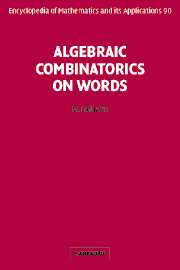Book contents
- Frontmatter
- Contents
- Preface
- Chapter 1 Finite and Infinite Words
- Chapter 2 Sturmian Words
- Chapter 3 Unavoidable Patterns
- Chapter 4 Sesquipowers
- Chapter 5 The Plactic Monoid
- Chapter 6 Codes
- Chapter 7 Numeration Systems
- Chapter 8 Periodicity
- Chapter 9 Centralizers of Noncommutative Series and Polynomials
- Chapter 10 Transformations on Words and q-Calculus
- Chapter 11 Statistics on Permutations and Words
- Chapter 12 Makanin's Algorithm
- Chapter 13 Independent Systems of Equations
- References
- Index of Notation
- General Index
Chapter 3 - Unavoidable Patterns
Published online by Cambridge University Press: 05 April 2013
- Frontmatter
- Contents
- Preface
- Chapter 1 Finite and Infinite Words
- Chapter 2 Sturmian Words
- Chapter 3 Unavoidable Patterns
- Chapter 4 Sesquipowers
- Chapter 5 The Plactic Monoid
- Chapter 6 Codes
- Chapter 7 Numeration Systems
- Chapter 8 Periodicity
- Chapter 9 Centralizers of Noncommutative Series and Polynomials
- Chapter 10 Transformations on Words and q-Calculus
- Chapter 11 Statistics on Permutations and Words
- Chapter 12 Makanin's Algorithm
- Chapter 13 Independent Systems of Equations
- References
- Index of Notation
- General Index
Summary
Introduction
In Chapter 1, avoidable and unavoidable sets of words have been defined. The focus was then on the case of finite sets of words. In the present chapter, we turn to particular infinite sets of words, defined as pattern languages. A pattern is a word that contains special symbols called variables, and the associated pattern language is obtained by replacing the variables with arbitrary nonempty words, with the condition that two occurrences of the same variable have to be replaced with the same word.
The archetype of a pattern is the square, αα. The associated pattern language is L = {uu|u ∈ A+}, and it is now a classical result that L is an avoidable set of words if A has at least three elements, whereas it is an unavoidable set of words if A has only one or two elements. Indeed, an infinite square-free word on three letters can be constructed, and it is easy to check that every binary word of length 4 contains a square. For short, we will say that the pattern αα is 3-avoidable and 2-unavoidable.
General patterns can contain more than just one variable. For instance, αβα represents words of the form uvu, with u, v ∈ A+ (this pattern is unavoidable whatever the size of the alphabet; see Proposition 3.1.2). They could also be allowed to contain constant letters, which unlike variables are never replaced with arbitrary words, but this is not very useful in the context of avoidability, so we will consider here only “pure” patterns, constituted only of variables.
- Type
- Chapter
- Information
- Algebraic Combinatorics on Words , pp. 111 - 134Publisher: Cambridge University PressPrint publication year: 2002
- 1
- Cited by



